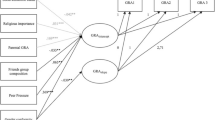Abstract
This study investigated the ways in which the gender of group leader and client might affect treatment outcome with young adolescents. Seventh- and eighth-grade students were involved in programs for enhancing social competence. Mixed-sex groups of adolescents received treatment from either male or female group leaders. Results revealed gender differences between the male and female adolescents on the outcome measures, no difference on outcome due to leader gender, and one interaction effect on a measure of social skills between adolescent gender and group leader gender. Acquisition of social skills, which takes place through modeling and observation, may be influenced by matched gender between leaders and adolescents; however, other competencies and abilities do not appear sensitive to leader and adolescent gender.
Similar content being viewed by others
References
Anastas, J. W., and Reinherz, H. (1984). Gender differences in learning and adjustment problems in school: Results of a longitudinal study.Amer. J. Orthopsychiatr. 54: 110–122.
Bandura, A. (1977).Social Learning Theory. Prentice-Hall, Englewood Cliffs, NJ.
Bernstein, B. L., and Figioli, S. W. (1983). Gender and credibility introduction effects on perceived counselor characteristics.J. Counsel. Psychol. 30: 294–297.
Bloom, L. J., Weigel, R. G., & Trautt, G. M. (1977). Therapeutic factors in psychotherapy: Effects of office decor and subject-therapist sex pairing on the perception of credibility.J. Consult. Clin. Psychol. 45: 867–873.
Bronfenbrenner, U. (1976). The disturbing changes in the American Family.Search. 4: 4–10.
Chandler, M. J. (1971).Egocentrism and Childhood Psychopathology: The Development and Application of Measurement Techniques. Paper presented at biennial meeting of the Society for Research in Child Development, Minneapolis, MI.
Chandler, M. (1973). Egocentrism and anti-social behavior: The assessment and training of social perspective taking skills.Develop. Psychol. 9: 326–332.
Chandler, M. J., Greenspan, S., and Burenboim, C. (1974). Assessment training of roletaking and referential communication skills in institutionalized emotionally disturbed children.Develop. Psychol. 10: 456–553.
Coleman, J. C. (1974).Relationships in Adolescents. Routledge and Kegan Paul, London.
Corrigan, J. D., Dell, D., Lewis, K. N., and Schmidt, C. (1980). Counseling as a social influence process: A review.J. Counsel., Psychol. 27: 395–441.
Costanzo, P. R. (1970). Conformity development as a function of self-blame.J. Personal. Soc. Psychol. 14: 366–374.
Dohrenwend, B. P., and Dohrenwend B. S. (1976). Sex differences and psychiatric disorders.Amer. J. Sociol. 81: 1447–1453.
Donovan, E., and Adelson, J. (1966).The Adeolescent Experience. John Wiley and Sons, New York.
Eme, R. (1979). Sex differences in childhood psychopathology: A Review.Psychol. Bull. 86: 574–593.
Feather, N. T. (1980). Values in adolescence. In Adelson, J. (ed.),Handbook of Adolescent Psychology. John Wiley & Sons, New York.
Finn, P. (1979). Teenage drunkenness: Warning signal, transient boisterousness, or symptom of social change.Adolescence 14: 819–834.
Frieze, I., Parsons, J., Johnson, P., Ruble, D., and Zellman, G. (1983).Women and Sex Roles: A Social Psychological Perspective. W. W. Norton, New York.
Garvin, C. D., and Reed, B. G. (1983). Gender issues in social group work: An overview.Social Work with Groups 6: 5–18.
Hardin, S., and Yanico, B. (1983). Counselor gender, type of problem and expectancies about counseling.J. Counsel. Psychol. 30: 294–297.
Heppner, P. P., & Pew, S. (1977). Effects of diplomas, awards, and counselor sex on perceived expertness.J. Counsel. Psychol. 24: 147–149.
Hill, C. E. (1975). Sex of client and sex and experience level of counselors.J. Counsel. Psychol. 22: 6–11.
Hoffman, C. D., Tsuneyoshi, S. E., Ebina, M., and Fite, H. (1984). A comparison of adult males' and females' interactions with girls and boys.Sex Roles 11: 794–811.
Hoffman, M. L. (1980). Moral development in adolescence. In Adelson, J (ed.),Handbook of Adolescent Psychology. John Wiley & Sons, New York.
Karoly, P., and Ruehlman, L. S. (1982). Gender differences in adolescents' reports of self-control problems.Cog. Ther. Res. 6: 235–237.
LeCroy, C. W. (1986). Social competence training. In Feldman, R. and Stiffmen, A. (eds.),Advances in Adolescent Mental Health (Vol. 2), JAI Press, Greenwich, CT.
LeCroy, C. W., and Rose, S. (1986). Promoting social competence in early adolescents: An experimental investigation.Social Work Res. Abstr. 22: 8–16.
Nowick, S., and Strickland, B. R. (1973). A locus of control scale for children.J. Consulting Clinical Psychol. 40: 148–154.
Paradise, L. V., Conway, B. S., and Zweig, J. (1986). Effects of expert and referent influence, physical attractiveness, and gender on perceptions of counselor attributes.J. Counsel. Psychol. 33: 16–22.
Perry, M. A., and Furukawa, J. M. (1980). Modeling methods. In Kanfer, F. H., & Goldstein, A. P. (eds.),Helping People Change (2nd ed.). Pergamon Press, New York.
Platt, J. J., Spivack, G., Altman, N., Altman, D., and Peizzer, S. B. (1974).J. Consulting Clinical Psychol. 42: 787–793.
Platt, J. J., Spivack, G., and Bloom, M. (1971). Means-ends Problem Solving Procedure (MEPS): Manual and Tentative Norms, Hahnemann Medical College and Hospital Philadelphia.
Platt, J. J., and Spivack, G. (1976).Workbook for Training in Interpersonal Problem Solving Thinking. Unpublished manuscript, Philadelphia, PA.
Robinson, J. P., and Shaver, P. R. (1972).Measures of Social Psychological Attitude. University of Michigan, Institute for Social Research, Ann Arbor, MI.
Spivack, G., and Levine, M. (1973).Self-regulation in acting out and normal adolescents. Report M-4531, N.I.H., Washington, D.C.
Spivack, G., Platt, J. J., and Shure, M. B. (1976).The Problem Solving Approach to Adjustment. Jossey-Bass, San Francisco.
Subich, L. M. (1983). Expectancies for counselors as a function of counselor gender specification of subject sex.J. Counsel. Psychol. 30: 421–424.
Van Duyne, H. J., and Scanian, D. (1976). Gender differences in the development of the regulatory function of language.J. Genet. Psychol. 18: 17–26.
Walters, J., and Peters, R. D. (1980). Social problem solving in aggressive elementary school boys. Paper presented at the Canadian Psychological Association Convention, Alberta, Canada.
Author information
Authors and Affiliations
Additional information
He received his Ph.D. at the University of Wisconsin-Madison. His major interests include developing and evaluating interventions for adolescents, social skills training, and practice evaluation for social workers.
Rights and permissions
About this article
Cite this article
LeCroy, C.W. An analysis of the effects of gender on outcome in group treatment with young adolescents. J Youth Adolescence 15, 497–508 (1986). https://doi.org/10.1007/BF02146091
Received:
Accepted:
Issue Date:
DOI: https://doi.org/10.1007/BF02146091




